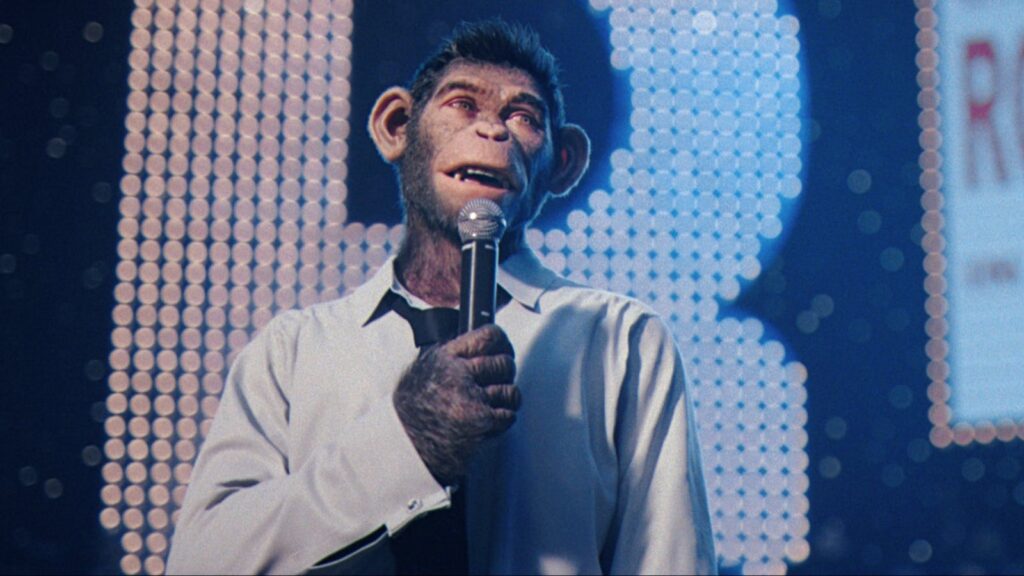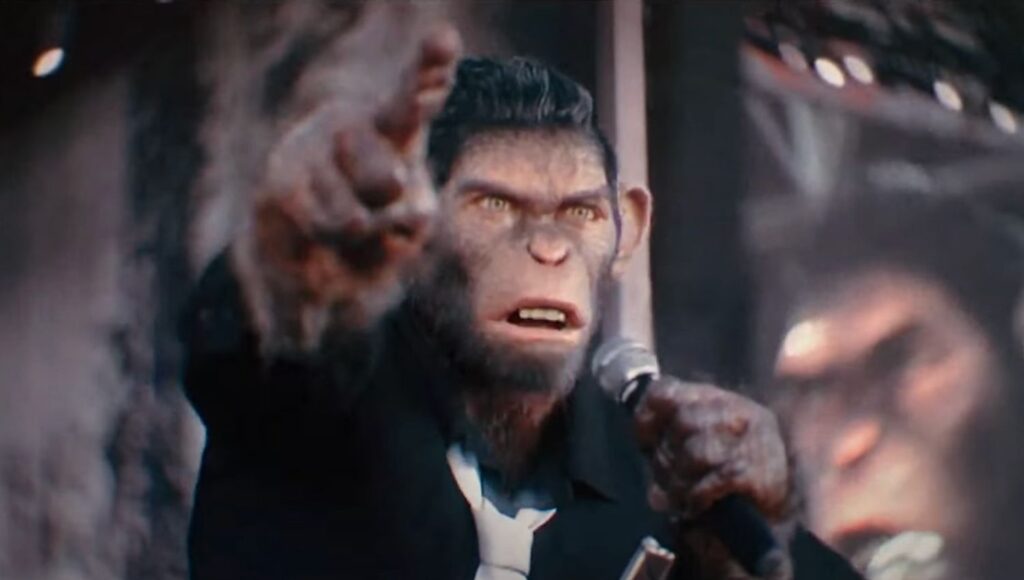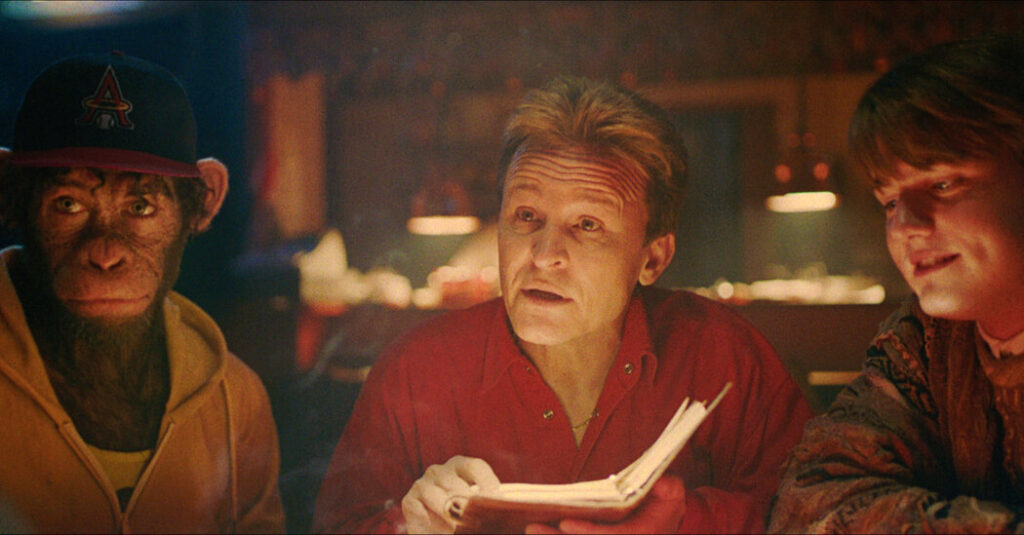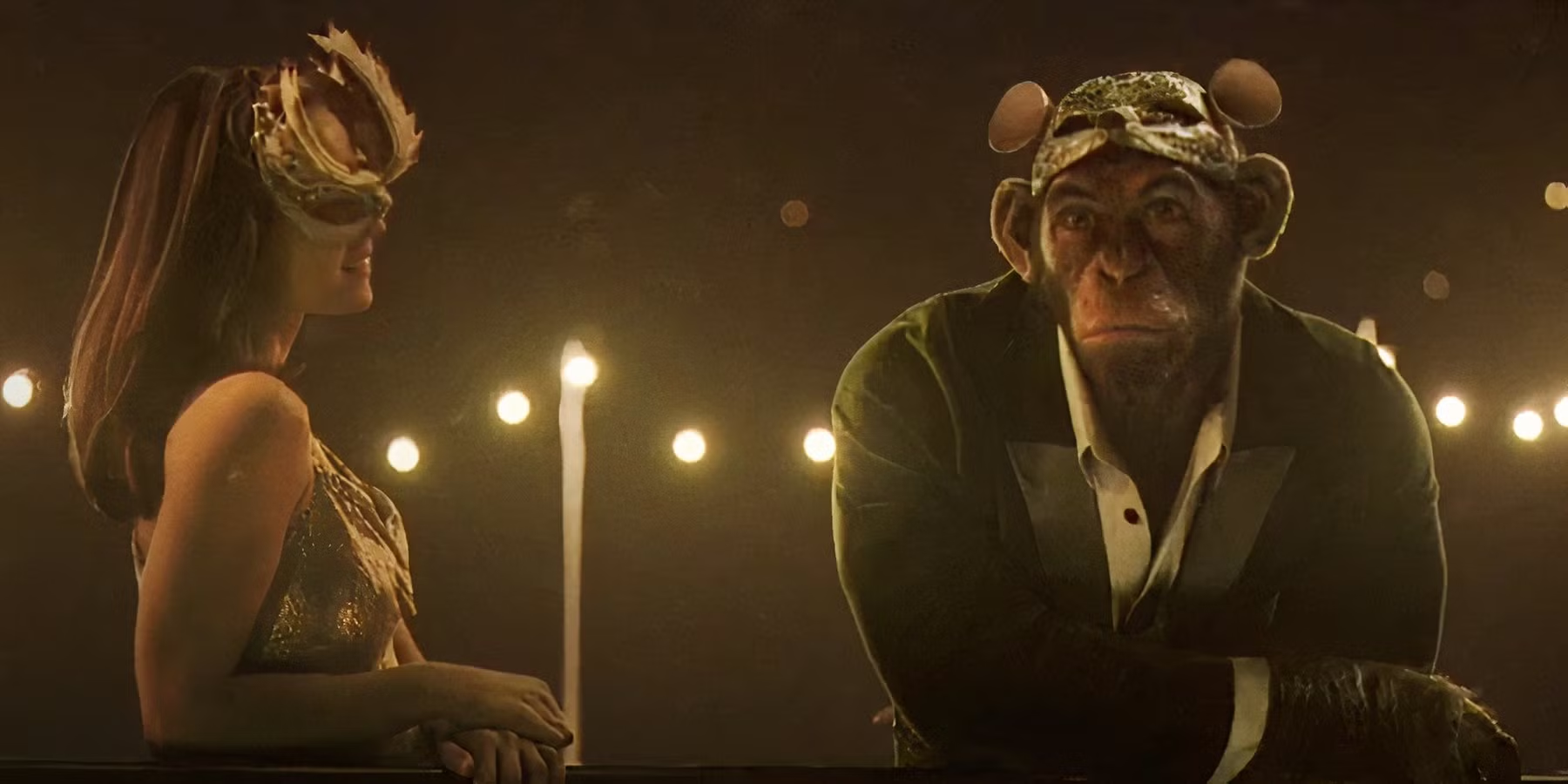
The story of an artist’s rise and fall and rise again, Better Man is in many ways a thoroughly typical picture. Like most musical biopics, it conforms to a three-act structure, dutifully following its hero’s rags-to-riches trajectory while interspersing boisterous performances of the songs that made them famous. Like most musical biopics, it juxtaposes euphoric highs (the thrill of nailing an audition, the joy of climbing the charts) with crippling lows (drug abuse, daddy issues). And like most musical biopics, it aims to provide a three-dimensional portrait of its subject while still ultimately lionizing them. In fact, Better Man is like most musical biopics in virtually every way. Except one.
I generally try to go into movies as cold as possible, but I’m wondering how a truly oblivious ticket-buyer might feel upon randomly selecting a screening of Better Man, settling in for the opening voiceover (in which its protagonist declares that he’s been called “narcissistic” and “punchable”), and then watching as the camera focuses on… a monkey. Not an actual monkey—a computer-generated chimpanzee who otherwise walks, talks, and behaves like a human, to the point where nobody remarks on his biological dissimilarity. Even the kids in Paddington acknowledge that they live with a bear. All of the characters here are either extraordinarily tolerant or exceedingly near-sighted.

So yes, while this film is nominally about the British pop star Robbie Williams, his on-screen incarnation appears to have wandered in from the Planet of the Apes franchise. Whether this is a stroke of brilliance or madness, it is undeniably a product of chutzpah. Directed by Michael Gracey (The Greatest Showman) from a script he wrote with Simon Gleeson and Oliver Cole, Better Man invites multiple readings as to why it deployed such a bizarre gambit. The more charitable one is that it’s designed to reflect the character’s low self-worth—a surrealistic depiction of how he sees himself as ugly and undesirable, and how he wields charisma and bravado as a way to counteract this perception. A more cynical interpretation is that Williams and Gracey, recognizing the tediously familiar caliber of their material, felt compelled to jazz it up with something arresting more than the normal razzle-dazzle choreography. The upshot is a movie that’s both wildly unusual and extremely conventional.
I don’t mean to diminish the inspired lunacy of Gracey’s conceit, the effects of which are wholly persuasive. (The motion-capture actor playing Robbie is Jonno Davies; I’d assumed Williams at least voiced the part, but that’s Davies too, though Williams does supply the musical vocals along with Adam Tucker.) Yet the irony of Better Man is that, by committing so completely to its outlandish premise, it undermines its own audacity. Its internal logic compels everyone to treat Robbie, despite his simian appearance, as a regular guy—sure, a selfish and arrogant person, but a person nonetheless. As a result, your initial astonishment quickly turns into passive acceptance. If nobody else cares that this caterwauling cutup looks like a primate, well, why should we?

Perhaps you’re inherently invested in Williams’ life story, though if so I suspect you live somewhere other than America. (My lone association with Williams was remembering that his cover of “Beyond the Sea” played over the closing credits of Finding Nemo.) Still, Gracey at least sketches the contours of the pop star’s early life with suitable efficiency. A burnout at school, Robbie uses his outsized confidence to impress a local music producer (Damon Herriman), earning himself a spot in the boy band Take That. From there, the plot is Biopic 101: As the group takes off, Robbie ascends to a modest level of fame, only to develop a drug and alcohol habit that results in his expulsion, disgrace, and eventual rehabilitation. Along the way he meets a pretty girl (Raechelle Banno), disappoints a loyal friend (Frazer Hadfield), takes solace in the embrace of his nan (Alison Steadman), and yearns for the approval of his dad, Peter (Steve Pemberton).
It’s standard stuff. What makes Better Man memorable, beyond its conceptual absurdity, is the brio that Gracey brings to the musical sequences. The movie’s obvious highlight is a bravura faux oner in the nighttime London streets, the camera slickly following the members of Take That as they rampage in and out of storefronts like cheerful pillagers. Later, Robbie’s encounter on a boat with his future fiancée transforms into a giddy and impressively concise montage, condensing most of their fraught liaison into a single ballad. And if the scene where Robbie performs at Knebworth before an enormous crowd at first recalls the Live Aid finale of Bohemian Rhapsody, it soon shifts into something far stranger—a sort of maniacal videogame battle in which he faces down alternate versions of himself.

Those selves, as it happens, function as one of the movie’s laziest metaphors: Whenever Robbie performs, he invariably sees a mirror image glowering in the crowd, at which point his bluster temporarily lapses into panic. This happens constantly, and the repetition quickly grows wearying. The same is true of Robbie’s anguished relationship with Peter, a born entertainer who’s less of a parent than a promoter. Peter’s early absence at a school play, his blindness toward Robbie’s emotional isolation, their obligatory reconciliation—it’s all pure cliché.
Better Man does exhibit flashes of insight into what makes its (anti)hero tick, such as an early scene where a mate rhapsodizes about loving his work and Robbie indignantly responds, “It doesn’t matter if you love it, what matters is that other people love you doing it.” That sense of preternatural crowd-pleasing—at one point, Robbie opines that actual talent is less important than the willingness to show off—dovetails with the character’s black hole of need, his perpetual quest for external affirmation. It’s an intriguing idea, but the movie doesn’t do much with it, instead just portraying Robbie as yet another young musician who was both seduced and traumatized by the spotlight.
It’s telling that the climax of Better Man features Robbie performing not one of his own songs, but a cover of “My Way”—a moment that cleanly bundles the movie’s curious contradictions. In the visible sense, it operates very much on its own terms. But on a more fundamental level, it’s just copying someone else’s greatest hits.
Grade: B-
Jeremy Beck is the editor-in-chief of MovieManifesto. He watches more movies and television than he probably should.
